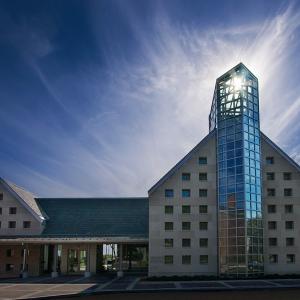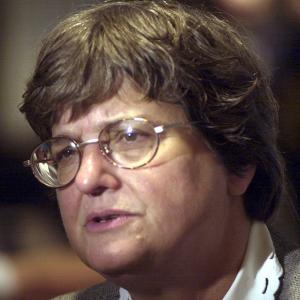G. Jeffrey MacDonald is an award-winning reporter and an ordained minister in the United Church of Christ.
Posts By This Author
To Keep Churches Safe, Government Gets Involved
“My job as the shepherd of the church is to protect the flock. And I will do so with whatever means I need.”
Russell Moore Faces a Challenging Road Ahead
For Russell Moore, whose sharp criticisms of Donald Trump voters nearly cost him his job as the public voice for America’s largest Protestant denomination, the path to regaining a prophetic platform is just beginning.
Moore started down that trail this week. After apologizing for being “unnecessarily harsh” during the campaign, he received a vote of confidence from the executive committee of the Ethics and Religious Liberty Commission, the public policy arm of the Southern Baptist Convention.
Can Latin American Liberation Theology Speak to Catholics Today?
For Catholics, the key to working collaboratively with Pope Francis, on issues from mass migration to climate change to Hispanic evangelization, may be found in a controversial movement that many left for dead long ago: liberation theology.
That message reverberated, from Feb. 6 to Feb. 10, through the halls of Boston College and a nearby retreat center, as nearly 40 theologians gathered from across the Spanish-speaking world to discuss the movement’s future with its founding figures.
United Methodist Association Forms to Push for Tough Line on Gays
Undoing the election of the first openly lesbian bishop in the United Methodist Church will be a primary goal when 1,500 Methodist evangelicals gather this week in Chicago to found a new renewal group, according to organizers.
At the inaugural meeting of the Wesleyan Covenant Association on Oct. 7, charter members will outline their expectations for a soon-to-be-appointed denominational commission to discuss the conflict over sexuality.
In Some Cities, Religious Liberty Invoked in Addressing Homelessness, Solar Power
“That’s why we really want to shift, and that’s our next goal if we can find a parcel,” said Fernandez, a member of the Roman Catholic Sisters of Mercy. “The owner, along with some of the neighbors, would work with Interfaith to say: ‘This is a religious right to take care of our homeless people.’”
Massachusetts Church Vigil Ending After 11 Years

Image via REUTERS / Brian Snyder / File photo / RNS
After 11 years of defiantly occupying a parish building that the Archdiocese of Boston ordered closed in 2004, the people of St. Frances X. Cabrini Church in Scituate, Mass., are finally handing over the keys. The tenacious protesters, angry their parish would be closed in the wake of the clergy sexual abuse crisis, lost their final Hail Mary bid to reopen the church May 16 when the U.S. Supreme Court declined to hear their case.
Gordon College Professor Sues for Retaliation Over LGBT Comments

Gordon College. Image via Mark Spooner / Gordon College / RNS
A Gordon College philosophy professor is suing her employer for allegedly breaching her free speech rights and retaliating after she publicly criticized the Christian school for its policy of not hiring sexually active gays and lesbians.
Gender Bias May Be Part of Episcopal Church Firings, Ex-Staffer Says

Image via Joseph Sohm / Shutterstock.com
When the Rev. Bob Honeychurch learned that the Episcopal Church’s presiding bishop was calling for staff culture reform after firing two senior administrators for misconduct, he had a hunch what some of those cultural issues might be. From 2008 to 2012, Honeychurch served on the national church staff, where he heard accounts of gender bias on multiple occasions. Women were excluded from important decision-making, Honeychurch said, even when they held high offices and had relevant skills and experience to offer. Respecting female colleagues as equals wasn’t the norm.
Experts Push Episcopal Church to Explain Firings

Washington National Cathedral. Image via Steve Heap / Shutterstock.com
The firing of two senior Episcopal Church administrators for unspecified reasons after a four-month misconduct investigation has prompted warnings that the church’s “cover-up” could endanger future victims. Some legal experts and advocates are calling for more disclosure about the managerial misconduct that led to the firings of Chief Deputy Operating Officer Sam McDonald and Director of Public Engagement Alex Baumgarten.
Two Lutheran Seminaries to Close and Reopen as New School

Lutheran Theological Seminary at Gettysburg, Pa. Image via Lutheran Theological Seminary/RNS
Two Lutheran seminaries in Pennsylvania are planning to close and launch together a new school of theology in 2017 with hopes of slashing costs and reversing years of declining enrollments. The decision came this week from the governing boards of Lutheran Theological Seminary at Gettysburg and Lutheran Theological Seminary at Philadelphia. The plan will cut the number of seminaries affiliated with the Evangelical Lutheran Church in America from eight to seven.
Faith-Based Groups Earn Millions on Refugee Loan Commissions

Image via Janossy Gergely / Shutterstock.com
Faith-based agencies that resettle refugees in America stand to gain more than a clear conscience if the United States — after what is expected to be a fierce debate in Congress — accepts a proposed 10,000 Syrian refugees next year.
More refugees also means more revenue for the agencies’ little-known debt collection operations, which bring in upwards of $5 million a year in commissions as resettled refugees repay loans for their travel costs. All nine resettlement agencies charge the same going rate as private-sector debt collectors: 25 percent of all they recoup for the government.
This debt collection practice is coming under increased scrutiny as agencies occupy a growing stage in the public square, where they argue America has a moral obligation to resettle thousands of at-risk Syrian refugees. Some observers say the call to moral action rings hollow when these agencies stand to benefit financially.
Oldest U.S. Graduate Seminary to Close Campus

Image via Andover Newton Theological Seminary / RNS
America’s oldest graduate seminary is once again blazing a trail for other mainline Protestant institutions to follow. But this time it’s a path many would rather not travel.
On Nov. 12, Andover Newton Theological School announced plans to relocate and sell its 20-acre campus in Newton, Mass. The move will be part of “a bold new direction” for the 208-year-old school as it struggles with big deficits.
“God is doing something new in this time,” said Andover Newton President Martin Copenhaver.
“We have to figure out what it is and get with the program.”
Sister Helen Prejean: Tsarnaev ‘Genuinely Sorry for What He Did’
Sister Helen Prejean, the Catholic nun and anti-death penalty activist whose story came to fame with the 1995 film Dead Man Walking, took the stand on May 11 in the penalty phase of convicted Boston Marathon bomber Dzhokhar Tsarnaev’s trial. She said he is “genuinely sorry for what he did,” and told her how he felt about the suffering he caused to the bombing’s victims.
“He said it emphatically,” Prejean said.
“He said no one deserves to suffer like they did.”
From Burlap Sack to Digital File, Church Records Get Makeover
Six years ago, the people of First Congregational Church of Rowley in Massachusetts were convinced they’d lost their treasure. A 17th-century minister’s 664-page diary, and its rare detailed account of community life in early America, had been missing for nearly two decades.
Then the phone rang.
A local bank was cleaning out its vaults when a staffer opened a burlap sack marked “dimes” and found an old leather-bound book with strange handwriting inside.
As Denominations Decline, Number of Unpaid Ministers Rises
The 50 members of All Saints Episcopal Church in Hitchcock, Texas, are looking forward to December, when Mark Marmon will be ordained their priest.
One reason for the excitement? They won’t have to pay him.
A 57-year-old fly fishing guide, Marmon, whose wife is a lawyer, says he doesn’t want or need a church salary. He belongs to a growing breed of mainline Protestant clergy who serve congregations in exchange for little or no compensation.
Where Are the Christians on Burying Tsarnaev?
Soon after the Boston Marathon bombings, local Christian leaders stepped swiftly into the public eye, convening vigils and urging peaceful healing in the wake of senseless violence.
But their public voices have fallen mostly silent as noisy resistance grows to the prospect that suspected bomber Tamerlan Tsarnaev could be buried in local soil.
Cemeteries and even some mosques have refused to take his body. His city, Cambridge, has urged family members to bury him elsewhere. Republican U.S. Senate candidate Gabriel Gomez and local talk radio host Dan Rae want him dumped in the ocean, like Osama bin Laden. Clergy have largely kept mum.
“The only signs of people who are showing some sort of moral conscience are those few who stand with a card near the funeral home saying [burial] is a corporal work of mercy,” said James Keenan, a moral theologian at Boston College. “To say, ‘we won’t bury him’ makes us barbaric. It takes away mercy, the trademark of Christians. … I’m talking about this because somebody should.”
Boston Amputees Face Long Spiritual Struggle Ahead
In the wake of the Boston Marathon bombings that left three dead and more than 260 injured, perhaps none face more significant adjustments or a longer road ahead than the 14 amputees who lost a limb.
For these victims, the path forward involves relearning almost everything, from getting out of bed to getting in a car. Whether they go on to lead satisfying lives depends largely on how they handle the spiritual challenges at hand, according to amputees and researchers.
Losing a limb is like losing a family member: It involves grief and mourning, according to Jack Richmond, a Chattanooga, Tenn., amputee who leads education efforts for the Manassas, Va.-based Amputee Coalition. When one’s body and abilities are radically changed, questions of meaning are suddenly urgent: Why did this happen? Why am I here?
“You’re wondering: Why did I live?” said Rose Bissonnette, an amputee and founder of the Lancaster, Mass.-based New England Amputee Association, a support organization for amputees.
Boston Bombings Bring Chaplains into New Ground
Two days after the Boston Marathon bombings, Boston Medical Center chaplain Sister Maryanne Ruzzo was checking on staffers who’d been caring for the injured when she received a page. A bombing victim wanted to see her.
The bedside was fraught with worry. A woman in her 30s had lost a leg to amputation as surgeons deemed it unsalvageable. Still suffering multiple injuries, she was now heading into surgery again, knowing she might wake up with no legs at all.
Ruzzo stood among the woman’s parents and siblings and did what she does best: listen. She heard their fears, including concern for the woman’s husband, who was being treated at a different hospital and who also might lose a leg to amputation. Then she prayed.
“Other people might not want to feel the pain and say, ‘Oh, it’s going to be fine,’” said Ruzzo, the Archdiocese of Boston’s coordinator of Catholic services at BMC. “We just try to be present and listen to them. … I prayed for the surgeons and the nurses.”
In a week when Boston hospitals cared for more than 170 bomb victims, staff chaplains were suddenly in great demand. They moved calmly from emergency departments to waiting rooms and employee lounges, offering a compassionate ear and much-needed comfort to anxious patients, family members and staffers.
All Eyes on Texas, S.C. Church Property Fights
When disgruntled congregations have left hierarchical denominations such as the Episcopal Church, they’ve often lost property battles as civil courts ruled buildings and land are not theirs to keep.
But outcomes could be different this year, court watchers say, as high-profile cases involving dozens of Episcopal congregations in South Carolina and Texas wind their way through state courts. That prospect has observers watching for insights that could shape legal strategies in other states and denominations.
Both cases involve conservative dioceses that voted to leave the Episcopal Church over homosexuality, among other issues. In South Carolina, congregations representing about 22,000 people are suing the Episcopal Church for control of real estate worth some $500 million and rights to the diocese’s identity. In Texas, the national Episcopal Church is suing about 60 breakaway congregations in the Fort Worth area for properties estimated to be worth more than $100 million.
Fasting Like an Old Testament Prophet Gains Followers During Lent
Amy Lester has followed Jesus for decades, but her keen appreciation for his sacrifice on the cross came only recently when she started eating like the prophet Daniel.
During Lent, which starts Feb. 13, the 40-year-old mother of two keeps a type of Daniel Fast, which involves eating only food from seeds (vegetables, fruits, unleavened grains), drinking only water and practicing daily devotions.
A similar regimen kept Daniel and his friends free from corruption in King Nebuchadnezzar’s Babylonian court, according to the Bible. Now the Old Testament example guides growing numbers of Christians in the 40-day period of preparation for Easter.
“We set apart a sacrifice in Lent in order to identify, even the smallest (bit), with what Jesus sacrificed for us,” said Lester, who attends University Carillon United Methodist Church in Oviedo, Fla. “He died for me. The least I can do is to sacrifice the foods that are comforting to me.”












